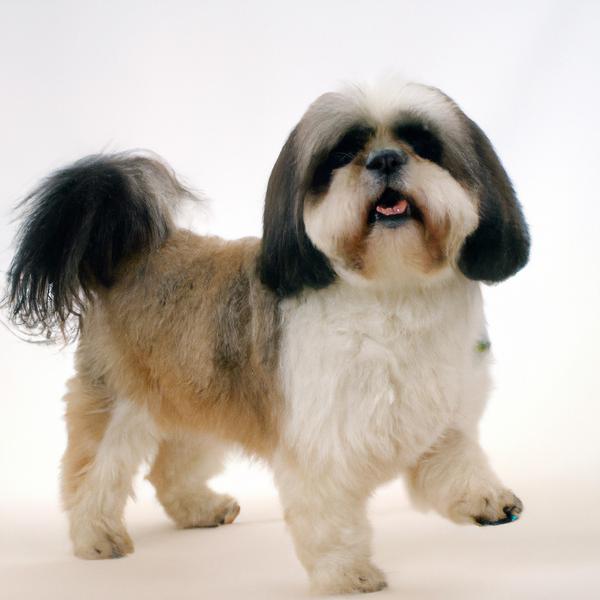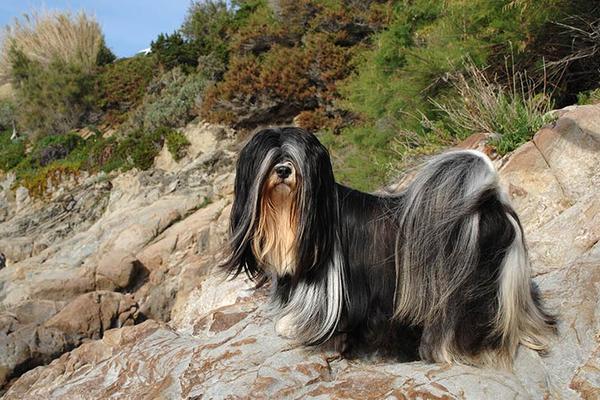Lhasa Apso
also known as Lion Dog, Lhasa

 History
History
The Lhasa Apso is a small, long-haired dog breed that originated in Tibet. They were first registered by kennel clubs in the early 20th century, with the American Kennel Club officially recognizing the breed in 1935.
The breed's name, "Lhasa Apso," is derived from the Tibetan capital city of Lhasa, where the breed was primarily kept as a watchdog in Buddhist monasteries and noble homes. "Apso" means "bearded" in Tibetan, referring to the Lhasa Apso's long, shaggy coat.
The Lhasa Apso was developed as a companion and watchdog breed. They are known for being loyal and protective of their owners, and make great watchdogs as they are quick to bark at any unfamiliar sounds or movements. They are also known for being hardy and adaptable, making them well suited for life in the harsh Tibetan climate.
While the exact origins of the breed are not known, it is believed that the Lhasa Apso was created by Tibetan monks, who carefully bred the dogs to be small, hardy, and able to withstand the harsh conditions of the Tibetan plateau.
The breed was first brought to the West in the early 20th century by British explorers and political figures who were visiting Tibet. The first Lhasa Apsos were brought to the United States in the 1920s, and the breed quickly gained popularity as a companion dog.
Breed Information
Is Lhasa Apso a purebred?
Purebred
How do you pronounce the Lhasa Apso name? How do you say Lhasa Apsos?
LAH-sa AHP-so
What were Lhasa Apsos originally used for?
Companion, Temple and Monastery Guardians
How Long Do Lhasa Apsos Live? What is average life expectancy for a Lhasa Apso? How long can Lhasa Apsos live?
12-15 years
The average Lhasa Apso lifespan is somewhere between 12-15 years, provided they aren't beset by any exceptional health issues or injuries.
Lhasa Apso Height & Weight
How big is a full grown Lhasa Apso?

| Height | ||||
|---|---|---|---|---|
| Average | 6 months | 12 months | 18 months | |
| Male | 10-11 inches (25.4 - 27.9 cm) | 8.5 inches (21.6 cm) | 9.5 inches (24.1 cm) | 10.5 inches (26.7 cm) |
| Female | 10-11 inches (25.4 - 27.9 cm) | 8.5 inches (21.6 cm) | 9.5 inches (24.1 cm) | 10.5 inches (26.7 cm) |
| Weight | ||||
|---|---|---|---|---|
| Average | 6 months | 12 months | 18 months | |
| Male | 14-18 pounds (6 - 8 kg) | 12.0 pounds (5 kg) | 13.5 pounds (6 kg) | 16.0 pounds (7 kg) |
| Female | 12-14 pounds (5 - 6 kg) | 10.0 pounds (5 kg) | 11.5 pounds (5 kg) | 13.0 pounds (6 kg) |
Do Lhasa Apsos get fat easily?
![]()
![]()
![]()
![]()
![]()
The Lhasa Apso is a breed that has an average risk of becoming obese. Daily walks and a balanced diet of quality dry dog food can help maintain a healthy weight. An active lifestyle and monitoring weight regularly is recommended.
Are Lhasa Apsos Hypoallergenic?
No
Unfortunately, the Lhasa Apso is not hypoallergenic, making it not a good choice for a dog lover who suffers from pet allergies.
What is a Lhasa Apso personality? What are Lhasa Apso dogs best known for?
Alert
Devoted
Intelligent
Obedient
Spirited
Assertive
Friendly
Lively
Playful
Steady
Are Lhasa Apsos heavy shedders? How Much Does a Lhasa Apso Shed?
![]()
![]()
![]()
![]()
![]()
Lhasa Apso dogs are heavy shedders, they will lose a significant amount of hair each year. To decrease the amount of shedding, you can regularly brush your Lhasa Apso. This will remove loose hair and keep his coat growing in the same direction.
What is the watchdog ability of a Lhasa Apso dog?
![]()
![]()
![]()
![]()
![]()
The Lhasa Apso dogs are average watchdogs. If they sense something different, this breed will alert their owner.
Breed History
Where do Lhasa Apsos come from?
Tibet
What are Lhasa Apsos descended from?
Terrier, Wolf-like Dog
What organizations or kennel clubs recognize/register the Lhasa Apso breed?
American Canine Registry
American Kennel Club
America's Pet Registry
Canadian Kennel Club
Dog Registry of America Inc.
Federation Cynologique Internationale
Kennel Club of Great Britain
North American Purebred Registry, Inc.
American Canine Association, Inc.
Australian National Kennel Council
Continental Kennel Club
National Kennel Club
New Zealand Kennel Club
United Kennel Club
Canadian Canine Registry
When were Lhasa Apsos first bred? How old is the Lhasa Apso breed?
Ancient Times
What Breed Group is a Lhasa Apso?
Non Sporting (AKC:1935)
Companion Breeds (UKC)

Lhasa Apso Appearance
What color are Lhasa Apso eyes?
Brown
What color can Lhasa Apso nose be naturally?
Black
What color can Lhasa Apso coat be naturally?
Black
Gray
Brown
Red
Cream
Fawn
Silver
White
Sable
Brindle
How long is a Lhasa Apsos coat?
![]()
![]()
![]()
![]()
![]()
The coat of a Lhasa Apso dog is generally known for its length.
How Dense Is The Lhasa Apso Coat?
![]()
![]()
![]()
![]()
![]()
What is the texture of the hair of a Lhasa Apso?
Straight
How many puppies can a Lhasa Apso have in a litter? How many puppies can a Lhasa Apso have in her first litter?
12-15 puppies per pregnancy
A Lhasa Apso can have a litter of 12-15 puppies on average. However, it's worth noting that the size of the litters can vary greatly. Factors that can influence litter size include the health of the mother, breeding history, and genetics.
![]()
![]()
![]()
![]()
![]()
Lhasa Apsos are known for their adaptability and versatility, they are capable of adapting well to a wide range of lifestyle changes and living environments. They are a highly adaptable breed, and make great companions for families and individuals of all lifestyles.

Lhasa Apso Health Issues
Do Lhasa Apsos have a lot of health problems?
![]()
![]()
![]()
![]()
![]()
The Lhasa Apso is a breed of dog that is known to have a higher frequency of health issues compared to other breeds. These issues can range from minor to serious, and regular check-ups with a veterinarian are essential in order to identify and address any potential problems as early as possible.
What are the major health concerns to be aware of when owning a Lhasa Apso?
Intervertebral Disc Disease
Urolithiasis
Eye Problems
What are the less significant issues to keep in mind when it comes to Lhasa Apsos?
Hydrocephalus
Eye Problems
Brachycephalic Syndrome
What are the occasional tests recommended for Lhasa Apso breed?
Eye
Skeletal
X-Rays
Physical Examination
Respiratory Tests

Lhasa Apso Needs and Activities
Do Lhasa Apsos have a lot of energy?
![]()
![]()
![]()
![]()
![]()
Lhasa Apsos are known for their high energy levels, so if you're looking for a more low-key dog, this breed may not be the best choice.
Do Lhasa Apsos need socialization? How social are Lhasa Apsos?
![]()
![]()
![]()
![]()
![]()
Lhasa Apsos have average social needs compared to other breeds. They are known to be less active and independent than other breeds, and they are content with spending time alone and with their human family.
How much exercise should Lhasa Apsos get?
![]()
![]()
![]()
![]()
![]()
The Lhasa Apsos a breed that requires only a small amount of physical activity to maintain a healthy lifestyle. These breeds are ideal for people with busy lifestyles, elderly people or those who have limited mobility. They also make great pets for those who live in small apartments or have limited outdoor space.
How much sleep should a Lhasa Apso have? Do Lhasa Apsos sleep a lot?
![]()
![]()
![]()
![]()
![]()
Lhasa Apsos dogs are tend to sleep less than other breeds, but they still require adequate sleep to maintain good health.
Does a Lhasa Apso drool a lot?
![]()
![]()
![]()
![]()
![]()
The Lhasa Apso is a breed of dog that is characterized by its minimal drooling, making it an ideal choice for people who dislike drool marks on their clothing.
How much does it bark?
![]()
![]()
![]()
![]()
![]()
Lhasa Apso dogs bark and howl frequently, they are not a good fit for quiet homes.
Do Lhasa Apsos exhibit aggressive behavior to safeguard their home and territory? Do they possess a natural tendency to guard?
![]()
![]()
![]()
![]()
![]()
Lhasa Apso dogs are known for being average at defending. They possess the capability to defend their territory or owners, but it is not their primary trait. They are not the best choice for guard dogs
Are Lhasa Apsos mouthy?
![]()
![]()
![]()
![]()
![]()
What is the likelihood of a Lhasa Apso running away? Do they have a tendency to explore or wander frequently?
![]()
![]()
![]()
![]()
![]()
Do Lhasa Apso dogs have a high prey drive?
![]()
![]()
![]()
![]()
![]()
What do Lhasa Apsos enjoy doing? How do I keep my Lhasa Apso busy?
Chasing, Being chased, Tug-of-war, Ear scratches, Chasing Cats, Hiking, Being groomed, Dog Parks, Eating Snacks, Walkign, Barking, Sniffing, Groomed, Catch treats, Walk, Fetch, Cuddling, Arguing, Naps, Food, Play, Cuddle, Talking, Kisses, Run, Toy, Socks, Bath time, Eating, Swimming
What is the energy level of a Lhasa Apso? How much energy does a Lhasa Apso have?
Medium
Lhasa Apsos are medium-energy dogs and typically enjoy socializing and playing casual or even sustained games of chase with other dogs. They may also have occasional periods of barking or racing around the house.
![]()
![]()
![]()
![]()
![]()
How far should a Lhasa Apso walk each week? How many miles should a Lhasa Apso walk every week?
6 miles / week
There's really no limit to how far you walk your dog as long as they're comfortable. For Lhasa Apso, it's at least 6 miles / week. Just remember to build distance and stamina gradually over time.
How much a Lhasa Apso should exercise a day? How much activity does a Lhasa Apso need?
60 minutes
In general most Lhasa Apsos usually need at least 60 minutes of exercise daily. This can be spread across the day and include all sorts of high-energy activities, like walking, running and playing.
What level of grooming should be provided for a Lhasa Apso?
![]()
![]()
![]()
![]()
![]()
This breed is known for having high grooming needs.
How often should you brush a Lhasa Apso?
Daily
Ideally, Lhasa Apso should be brushed at least 2 or 3 times a week (preferably daily) improve shedding.
What are the most commonly used brushing tools for Lhasa Apsos?
Pin Brush
Dematter
Comb
Nail Clipper
Costs
How many cups of food does a Lhasa Apso eat?
1.3 cups
For an average 14-18 pound (6 - 8 kg) Lhasa Apso feed 1.3 cups daily. But, keep in mind, the amount you feed is going to be dependent on the quality of the food you are feeding.
How Much Does a Lhasa Apso Cost Daily?
$1.40 - $1.80 / day
The average cost of a Lhasa Apso is somewhere $1.40 - $1.80 per day.
How Much Does a Lhasa Apso Cost Per Month?
$42 - $53 / month
The average per month expenses of a Lhasa Apso is between $42 - $53. This makes an average of $504 - $636 per year. It will be on the higher side when the dog is still small because it will need more frequent visits to the vet, shots.
Lhasa Apso Characteristic
How intelligent is a Lhasa Apso?
![]()
![]()
![]()
![]()
![]()
The Lhasa Apso have below the average degree of obedience intelligence among other breeds. However, calling them “dumb dogs” is unfair. Where Lhasa Apsos lack in obedience & working intelligence, they make up for it with their keen ability to understand human emotions.
How sensitive is a Lhasa Apso dog?
![]()
![]()
![]()
![]()
![]()
This dog breed is particularly attuned to its environment and the emotions of those around it. It can be easily overwhelmed by loud noises, new environments, and unfamiliar people or animals. This dog is best suited for individuals or families who are patient, gentle, and understanding of its sensitive nature. It may also benefit from a calm and stable home environment, with a consistent routine and plenty of positive reinforcement training.
Are Lhasa Apso dogs affectionate?
![]()
![]()
![]()
![]()
![]()
Do Lhasa Apso do well in apartments? Are Lhasa Apsos good indoor dogs?
![]()
![]()
![]()
![]()
![]()
Lhasa Apsos are known for being excellent apartment dogs. They are fairly active indoors and will do okay without a yard.
Are Lhasa Apsos good with kids? Are Lhasa Apsos good around children?
![]()
![]()
![]()
![]()
![]()
A Lhasa Apsos typical characteristics indicate that this breed of dog is an ideal companion for kids and makes them family pets. Their gentle and protective nature and calm mentality make them gel along quickly with the younger humans
Are Lhasa Apsos good for elderly?
![]()
![]()
![]()
![]()
![]()
Are Lhasa Apsos good with cats? How friendly Lhasa Apsos are toward cats?
![]()
![]()
![]()
![]()
![]()
Lhasa Apsos are very cat friendly dogs. They generally make good companions for cats.
Do Lhasa Apso dogs get along with other dogs? Are Lhasa Apsos OK with other dogs?
![]()
![]()
![]()
![]()
![]()
Lhasa Apsos are very friendly towards other dogs. This breed typically have a happy and affectionate temperament around dogs.
How do Lhasa Apso dogs interact with other pets? Are they considered pet-friendly?
![]()
![]()
![]()
![]()
![]()
Are Lhasa Apsos friendly with strangers?
![]()
![]()
![]()
![]()
![]()
Lhasa Apsos are average friendly around strangers. They can be wary around strangers and a little standoffish. Early socialisation is key.
Do Lhasa Apsos like to play? Are Lhasa Apsos playful?
![]()
![]()
![]()
![]()
![]()
Lhasa Apsos have an average level of playfulness. The Lhasa Apsos, like other dogs, like to play. But they are not the most playful dog breed.
Are Lhasa Apso easily trained?
![]()
![]()
![]()
![]()
![]()
Lhasa Apso dogs are usually easy to train, but may require consistency to fully obey commands.
 Pros & Cons
Pros & Cons
Pros
- Cat Friendly
Lhasa Apsos are inclined to be accepting of cats. - Good with children
Known to be good with children and make great family pets - Apartment Friendly
Lhasa Apso dogs are well-suited to apartment life. - Friendliness
Friendly and outgoing, making them a good option for those looking for a sociable dog
Cons
- Not suitable for office environment
Keeping a Lhasa Apso in an office may not be ideal - Not Hypoallergenic
Lhasa Apsos may not be the best choice for those with allergies, as they may cause allergic reactions. - Shedding
Lhasa Apsos are a type of dog that shed a lot. - Barking
A distinctive trait of the Lhasa Apso breed is their loudness.